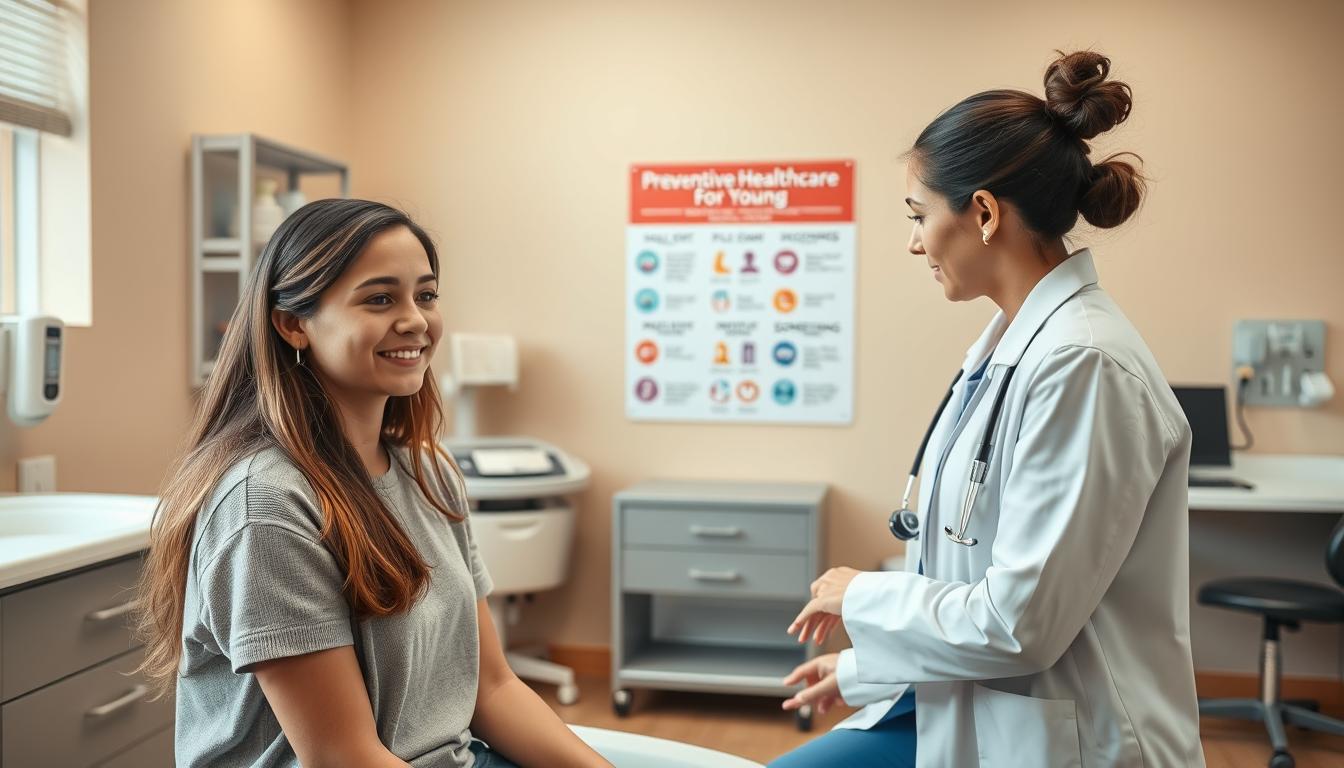As a young woman under 25, navigating your health can feel daunting, especially when faced with various health issues. This guide provides you with essential tips for young females’ health that will help you effectively manage common concerns. From understanding reproductive health problems to recognizing the importance of mental well-being, each aspect plays a crucial role in maintaining your overall health. Equip yourself with the knowledge to identify symptoms and embrace healthy lifestyle choices that contribute to a balanced and vibrant life.

Key Takeaways
- Understanding health issues can empower young women to seek timely care.
- Recognizing symptoms is crucial for addressing women’s health problems early.
- Preventive healthcare is essential for maintaining long-term health.
- Nutrition plays a vital role in overall health, particularly for young females.
- Mental well-being is equally important and should not be overlooked.
- Regular physical activity contributes significantly to a healthy lifestyle.
Understanding Common Health Issues in Young Women
Young women encounter various health issues that significantly impact their quality of life. Many face women’s health problems that range from reproductive health challenges to mental health concerns and lifestyle-related conditions. Common health issues in young women include menstrual irregularities, stress, anxiety, and nutritional deficiencies. Understanding these challenges can empower you to take control of your health.
Statistics indicate that around 20% of young women experience some form of health problem that affects their daily lives. Being aware of these issues allows for better advocacy for your health needs. Taking the time to educate yourself on these common health issues in young women can lead to informed decision-making regarding your well-being.
By acknowledging and addressing these women’s health problems, you can adopt habits and seek medical guidance that enhance your overall health. This proactive approach sets the foundation for a healthier life ahead.
Recognizing Signs of Women’s Health Problems
Awareness of your body is vital when it comes to recognizing signs of women’s health problems. Pay attention to common indicators, as they can serve as crucial alerts for potential health issues. Severe menstrual cramps that disrupt daily activities may signify underlying conditions. Irregular periods might indicate hormonal imbalances, while unexplained weight changes can hint at metabolic or endocrine disorders.
Mood swings can also provide insight into your overall health. Sudden emotional changes may reflect deeper issues requiring attention. You may ignore minor symptoms, thinking they will resolve on their own. The American College of Obstetricians and Gynecologists highlights the importance of recognizing these signs early to prevent complications.
Seek medical advice promptly when experiencing concerning changes. Regular vigilance can lead to timely interventions, allowing for better health management and improved quality of life.

Health Issue Young Woman: Addressing Reproductive Health Concerns
Reproductive health in young women encompasses a range of issues, including menstrual irregularities and conditions like Polycystic Ovary Syndrome (PCOS). Understanding these concerns forms the foundation for effective management and overall well-being.
Menstrual Irregularities
Menstrual irregularities can manifest in various ways, such as heavy bleeding, prolonged periods, or missed cycles. These symptoms may indicate hormonal imbalances or other underlying conditions. Addressing these irregularities early can help you better understand your body and necessary adjustments to maintain optimal reproductive health.
Polycystic Ovary Syndrome (PCOS)
PCOS affects approximately 1 in 10 women and is characterized by hormonal imbalances that often lead to symptoms like weight gain, acne, and fertility challenges. Recognizing the signs of PCOS is crucial for seeking timely diagnosis and treatment. Managing PCOS effectively can significantly improve your quality of life and reproductive health in young women.
Importance of Preventive Healthcare for Young Women
Preventive healthcare for young women plays a critical role in ensuring long-term health and well-being. Engaging in routine check-ups is fundamental, as this practice allows for early detection of health issues, fostering timely interventions. Taking charge of your health equips you with the knowledge and support necessary to navigate various health challenges.
Routine Check-Ups
Routine check-ups serve as a cornerstone for maintaining health. During these visits, healthcare providers can assess your reproductive health, monitor mental well-being, and conduct necessary screenings. Regular appointments not only help you stay informed about your health status but also create a safe space for discussing concerns that may arise. Incorporating these measures empowers you to prioritize your well-being actively.
Vaccinations and Preventive Screenings
Vaccinations and preventive screenings are vital components of preventive healthcare for young women. The Centers for Disease Control and Prevention recommends several vaccines that protect against diseases like HPV and influenza. Additionally, screenings such as Pap smears and breast exams facilitate early detection of potential health threats. Being proactive about these aspects of healthcare allows you to make informed decisions and safeguard your future health.

| Type of Preventive Healthcare | Frequency | Purpose |
| Routine Check-Ups | Annually | Monitor overall health and address concerns |
| Vaccinations | As per schedule | Prevent serious diseases |
| Pap Smear | Every 3 years (starting at age 21) | Detect cervical cancer |
| Breast Exam | Annually | Identify breast health issues |
Nutrition and Healthy Eating Habits
Understanding the importance of proper nutrition is essential for young women. Your dietary choices significantly affect various aspects of health, from energy levels to emotional well-being. Emphasizing a balanced intake of specific nutrients can help maintain both physical and mental health.
Essential Nutrients for Young Women
Young women require a variety of nutrients to support growth, bone health, and energy levels. Key nutrients include:
- Calcium: Vital for bone density and prevention of osteoporosis.
- Iron: Crucial for energy and preventing fatigue, especially during menstruation.
- Vitamin D: Supports calcium absorption and promotes bone health.
- Folate: Important for cell division and adequate for those considering pregnancy.
- Protein: Essential for muscle development and overall body repair.
Addressing Eating Disorders
Eating disorders can emerge during young adulthood, often requiring heartfelt attention and intervention. Addressing eating disorders involves professional support to foster a healthy relationship with food. The National Eating Disorders Association emphasizes the significance of understanding these disorders and seeking help as needed. Maintaining healthy eating habits can help mitigate the risk of developing these issues, ensuring a balanced approach to nutrition for young women.

Mental Health and Emotional Well-Being
Mental health is essential for your overall well-being. Young women often face unique challenges that can impact their emotional well-being, including societal pressures and personal expectations. Anxiety and depression are two of the most common issues among women under 25, and being aware of the signs is crucial for seeking help.
Look for signs such as persistent sadness, difficulty concentrating, and changes in your sleeping patterns. These symptoms may indicate the need for support or professional help. The Substance Abuse and Mental Health Services Administration (SAMHSA) offers resources that can guide you through managing mental health challenges effectively.
Prioritizing emotional well-being is just as vital as maintaining physical health. Incorporating self-care strategies into your routine, such as mindfulness, physical activity, and connecting with loved ones, can significantly enhance your mental health. Understanding the importance of mental health for young women encourages proactive steps toward maintaining a balanced and fulfilling life.
Physical Activity and Fitness Tips for Young Females
Engaging in physical activity is crucial for your overall well-being. Regular exercise provides significant benefits, impacting both your body and mind positively. It reduces stress, enhances mood, and increases your energy levels. Incorporating fitness into your routine can transform your daily life, making it more vibrant and enjoyable.
Benefits of Regular Exercise
Regular exercise contributes to better health in numerous ways:
- Improved cardiovascular health: Promotes a healthy heart and circulation.
- Weight management: Aids in maintaining a healthy weight.
- Enhanced mental health: Exercise releases endorphins, which help alleviate anxiety and depression.
- Better sleep quality: Physical activity helps regulate your sleep patterns.
- Increased strength and flexibility: Reduces the risk of injuries and enhances mobility.
Finding an Enjoyable Routine
Staying active becomes easier when you find an exercise routine that excites you. Consider the following ideas to cultivate a fitness regimen that fits your lifestyle:
- Group classes: Join local or online classes like Zumba, spin, or Pilates.
- Outdoor activities: Explore hiking, cycling, or jogging in a nearby park.
- Team sports: Participate in volleyball, soccer, or basketball to combine exercise with social interaction.
- Yoga and meditation: Not only builds strength but also promotes relaxation and mindfulness.
The American Heart Association recommends at least 150 minutes of moderate aerobic activity each week for optimal health. Embracing these fitness tips for young females can significantly improve your quality of life and foster a healthier you.
Conclusion
Taking charge of your well-being is essential, especially when it comes to managing women’s health issues. By understanding common health concerns and recognizing their symptoms, you empower yourself to make informed decisions about your health. Incorporating health tips for young females into your daily routine can help you stay proactive and engaged in your wellness journey.
Remember, preventive care plays a crucial role in ensuring a healthier future. Routine check-ups and screenings can help catch potential issues early, making it easier to address them effectively. As you navigate through different stages of life, focusing on small, consistent steps toward better health will have a profound impact on your overall well-being.
Your health is worth investing in, and being mindful of nutrition, mental health, and physical activity can lead to a balanced lifestyle. By embracing these approaches, you will not only enhance your quality of life but also inspire those around you to prioritize their health. Start today, and you may find that managing women’s health issues becomes more manageable with the right tools and knowledge.
FAQ
What are some common health issues in young women?
Young women often face a variety of health issues such as menstrual irregularities, stress, anxiety, nutritional deficiencies, and reproductive health problems. Understanding these concerns is crucial for effective management.
How can I recognize signs of women’s health problems?
Pay attention to common signs such as severe menstrual cramps, irregular periods, unexplained weight changes, mood swings, and persistent sadness. Recognizing these symptoms early can lead to timely intervention.
What should I consider regarding reproductive health in young women?
Reproductive health issues, like Polycystic Ovary Syndrome (PCOS) and menstrual irregularities, can greatly impact your quality of life. It’s important to consult a healthcare provider if you experience related symptoms.
Why is preventive healthcare important for young women?
Preventive healthcare is vital as it helps catch potential health issues early. Routine check-ups, vaccinations, and screenings can aid in monitoring your health and preventing future complications.
What nutrition tips should young women follow?
Focus on a balanced diet rich in essential nutrients such as calcium and iron. Understanding proper nutrition can help maintain your physical health and address issues like eating disorders with the right guidance.
How does mental health impact young women?
Mental health is a crucial aspect of overall health, especially for young women who may experience anxiety and depression. It’s important to recognize signs of distress and seek help if needed to maintain emotional well-being.
What are some fitness tips for young females?
Engaging in regular physical activity is essential. Find an enjoyable workout routine—such as yoga, swimming, or team sports—to stay active and boost your mood and energy levels.
How can stress management benefit young women’s health?
Effective stress management strategies, such as mindfulness, exercise, and proper sleep, can significantly improve your overall health. Reducing stress is vital for maintaining both mental and physical well-being.
